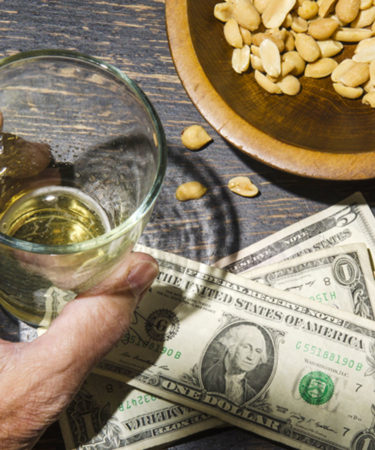This week, scary reports warned craft beer drinkers that our pints are about to get more expensive. This, allegedly, is due to snowy weather “[flattening] barley crop” and “[roiling] malt supplies” in Canada, one of the U.S.’s top barley imports.
This led to a 12 percent price jump in spot prices for barley grown in October, Bloomberg reported. In addition, a heat wave and drought in Europe impacted crops there, with the price of French barley jumping 35 percent, Fortune reports.
I call balderdash. While yes, weather impacts crop production and climate change is a real concern, I doubt this will affect U.S. beer consumers as much as these reports say. As Bart Watson, chief economist of the Brewers Association, summed it up in an email: “[It] could have a small effect, but isn’t the biggest worry at the moment.”
Malting barley prices might rise for small brewers, Watson says, but it’s not cause for industry-wide panic. “Because larger brewers have contracted pricing, they feel the little ups and downs a bit less, whereas smaller brewers — anyone who is buying on spot at less than silo sizes — will experience bigger price swings,” he writes.
Plus, most of the barley used for malting was unaffected. Bigger worries include aluminum costs and freight costs, Watson says. About 20 percent of malt is imported in the U.S., and a majority of that is from Canada, “but the U.S. crop this year mitigates those fears,” Watson says.
Beer’s supply chain ebbs and flows. There’s no need to freak out about the Canadian barley prices right now. If you’re extremely concerned and have deep pockets, go buy lots of beer from a smaller brewer whose cost of business might be affected. Otherwise, relax. Our beer, and our wallets, are going to be fine.
Craft Beer Is Embarrassingly Unsustainable
The Brewers Association released a sustainability report on Wednesday that looks into craft breweries’ environmental efforts. Although sustainability stars like Alaskan, Bear Republic, Kona, and Sierra Nevada Brewing are highlighted in the report, their exemplary efforts show that the industry as a whole has a long way to go.
Let’s start with water, for example. On average, brewers use seven gallons of water to make one gallon of beer. At smaller, less efficient breweries, the ratio is often higher. This water is used for the beer itself, as well as cleaning, cooling, and packaging processes. Seven-to-one is a huge loss not only for the brewery, which could be putting that water to use in other ways in the brewhouse, but for the land it ultimately depends on to make its product.
A few established breweries have made great strides worth celebrating. According to the report, Alaskan Brewing of Juneau, Alaska was the first craft brewery to install CO2 reclamation. Bear Republic, based in Healdsburg, Calif., reduced its liquid waste by about 5,000 gallons per week. And Sierra Nevada recycles 96 percent of its waste material. These are huge accomplishments. But they represent a small sample of the brewing community. Out of the BA’s 4,679 members, just 68 participated in the sustainability study. This is not enough.
If the craft beer industry is going to sustain, more companies need to address sustainability efforts from start to finish — from the brewery planning phase, to the buildout, to the employee on-boarding process, and, ultimately, to managing waste from the brewing process. The resources are out there. It’s time we start taking “community” to the next level.
Japanese Brewery Pivots to Cure the Common Cold
Japan’s second-largest brewer, Kirin, is shifting its core business from beer to health products.
According to Japan Times, Kirin CEO Yoshinori Isozaki told the Sankei Shimbun newspaper that the company will shift its strategy to “health and illness-preventing” solutions. The products, which Kirin plans to launch globally, will “use its proprietary lactic acid bacteria technology, which it believes can prevent illnesses like the common cold and influenza,” Japan Times reports.
It may sound experimental, but Kirin expects its health care division revenue to triple to ¥100 billion ($880 million).
Plus, Japan is the king of unique beverages. It invented canned coffee, has been championing yogurt drinks since the 1930s, and offers alcohol-free beer at many bars.
Kirin’s decision parallels beverage trends stateside. The biggest U.S. brewers are aggressively expanding into non-alc, health-adjacent spaces like kombucha, cannabis-infused beverages, and low-calorie sparkling waters (and even non-sparkling waters. Gross).
Some companies have also released “healthy” beers, like Sufferfest Beer Company, Zelus Beer Company, and even Goose Island.
The world’s collective palate is speaking: We want more beverages, and we want a beverage to fit each experience. The same customer who once funneled cheap beer might also reach for kombucha, or maybe even a probiotic energy shot. Beer drinkers are officially health-conscious, and it’s smart for brewers to pay attention.
